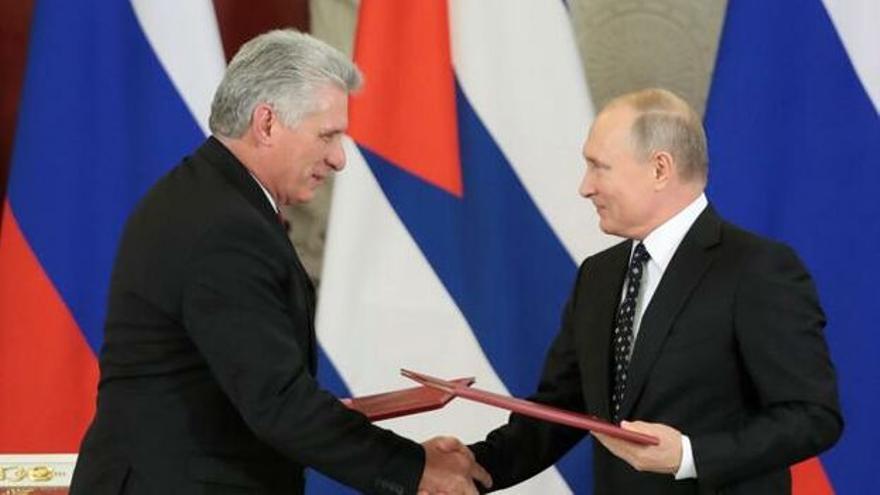
![]() 14ymedio, Pedro Corzo, Miami, 4 June 2023 — It is evident that the Kremlin exerts a more than fatal attraction on the Castros. I do not say Russians or Communists; it’s those famous buildings that have transcended in time as a symbol of power and devotion for those who think and feel like autocrats, a feeling shared to the core by the Cuban rulers, without a doubt, the most representative despots of that fervor.
14ymedio, Pedro Corzo, Miami, 4 June 2023 — It is evident that the Kremlin exerts a more than fatal attraction on the Castros. I do not say Russians or Communists; it’s those famous buildings that have transcended in time as a symbol of power and devotion for those who think and feel like autocrats, a feeling shared to the core by the Cuban rulers, without a doubt, the most representative despots of that fervor.
First were the tsars, then the general secretaries of the Communist Party and now Colonel Vladimir Putin, who, as a good KGB, knows that the Island can be his most reliable preserve, since exploitation knows no limits or borders there. Everything seems to indicate that the employee of the Castro family, Miguel Díaz-Canel, is pushing himself harder than his predecessors, something impossible to imagine, to be in that situation.
Fidel and Raúl Castro handed over Cuba to the Soviet leaders. The bolos, as the Cubans called them, could do whatever they wanted, including settling anywhere in the national territory, in exchange for a very generous subsidy that allowed the construction of the wall of totalitarianism.
The eagerness to Sovietize Cuba was so intense that the regime, since 1959, has granted scholarships to tens of thousands of young people to study in the communist paradise. Paradoxically, a significant number of those young people did not buy the fable, becoming staunch enemies of communist proposals, many of them assuming leadership positions, particularly in Europe, in the fight against the Castro regime.
Soviet power in Cuba was overwhelming. The Castros responded blindly to Moscow’s mandates abroad and applied the precepts of their Motherland to the interior of the Island. Cubans of my generation should not forget that Soviet and Russian literature flooded libraries and bookstores, cinema was a propaganda festival about the invincible socialist world and the artistic companies of the communist area did not cease with their great spectacles.
Nor should we leave aside the chronic shortage of food that was solved with the magical appearance of a can of Russian meat; that the most popular medicine, for a time, was a balm of resins with a name impossible to pronounce, until both disappeared; and that, after standing in line for hours to enter a miserable amusement park, access was denied to Cubans if a group of tourists from the socialist countries arrived.
The privileged relationship between Havana and Moscow was not interrupted because the Castros were nationalists but because the Kremlin of the time, managed by Mikhail Gorbachev, decided not to continue paying the bills of the country that had contributed the most to Soviet bankruptcy.
Now, as former political prisoner José Estrada wrote a while ago, former military, KGB and their heirs are returning, for the moment dressed in civilian clothes and discussing investments and profits, as in the past they instructed the repressors and Island bureaucrats on how to implement effective social control. In turn the Castros, not at all selfish, shared these tools with their associates from Venezuela, Nicaragua and Bolivia, just as they would with any enlightened leader ready to implement their instructions.
The autocrat Díaz-Canel and his henchmen have declared that they are ready to provide special conditions to Russian businessmen, “including the right to use Cuban land for 30-year terms, the tax-free importation of agricultural machinery and the right to repatriate the profits in foreign currency, which the Cuban Government currently restricts.”
This second triumphal entry of Russia into Cuba, by the hand of Vladimir Putin, does not seek to solve the needs of the population, but to perpetuate the Castro dynasty in government and strengthen an alliance with the Kremlin that to some extent revives the old military association, a situation that directly threatens Western democracies.
The dictator Díaz-Canel and his mentor, Raúl Castro, know that there are more profitable opportunities in the world than those of the Russians, but for them they are inadmissible, since their survival means exercising strict control over the sector of society capable of producing wealth, and the development of the economy must conform to the interests of the ruling class.
Translated by Regina Anavy
____________
COLLABORATE WITH OUR WORK: The 14ymedio team is committed to practicing serious journalism that reflects Cuba’s reality in all its depth. Thank you for joining us on this long journey. We invite you to continue supporting us by becoming a member of 14ymedio now. Together we can continue transforming journalism in Cuba.
